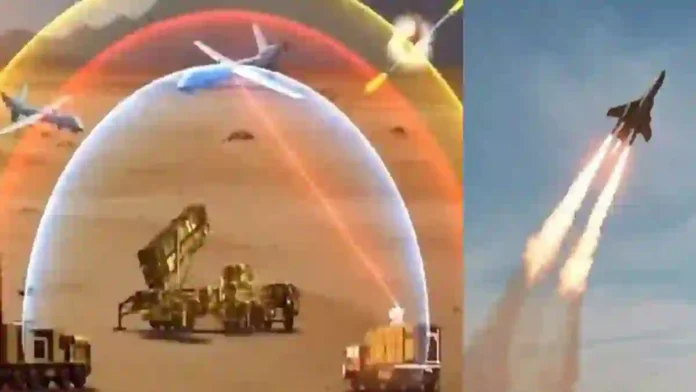India and Russia are entering a new phase of strategic cooperation as Moscow has expressed its willingness to participate in New Delhi’s ambitious defence initiative, the Sudarshan Chakra project.
The system, unveiled by Prime Minister Narendra Modi during his Independence Day address, is projected as a next-generation air defence platform that will augment India’s indigenous capabilities. Russia, given its long and tested record as India’s military partner, sees itself as an integral player in this program.
Read- Evolution of India’s Formidable Autonomous Combat Stealth Drone: Ghatak
The Russian Charge d’Affaires stated unequivocally that Russian equipment and expertise are expected to form part of this venture, underlining Moscow’s intent to remain central to India’s evolving defence architecture even as New Delhi gradually diversifies procurement sources and enhances indigenisation under its “Atmanirbhar Bharat” initiative.
At the same time, Russia remains a critical partner in India’s energy security strategy. The Russian diplomat Babushkin strongly criticised the United States for what he described as “unjustified” pressure on India to curtail its import of Russian crude oil.
He noted that Washington’s sanctions on Moscow and its indirect punitive measures against Indian companies not only undermine global economic stability but also threaten energy market dynamics. India, however, has consistently defended its purchase of Russian oil, highlighting that its procurement is guided strictly by national interest, affordability, and supply security.
The decision to source Russian crude—as Western buyers shunned Moscow following its 2022 invasion of Ukraine—proved economically beneficial, with India effectively cushioning itself against volatile global prices through discounted barrels. Consequently, Russia’s share of India’s oil imports surged from just 1.7% in 2019–20 to a commanding 35.1% in 2024–25, cementing Russia as India’s single largest crude supplier.
While Moscow acknowledged that Western tariffs and sanctions could potentially cause a 5% swing in oil import prices, Russian representatives conveyed confidence that mutual negotiations and strategic adjustments will ensure continued growth in bilateral energy cooperation. Babushkin underscored that the sanctions regime is proving counterproductive, hurting the economies of sanctioning states while strengthening alternative energy alliances.
Read- India May Be First To Fly France’s Upgraded Rafale F4.1 Standard
Read- Godrej Advances 90 kN Engine Development For TEJAS MK-2 And Future AMCA Stealth Jet
He argued persuasively that if India were to halt purchases from Russia, it would neither ensure stable supply from Western sources nor reflect a genuinely “mutually beneficial” arrangement. Instead, Western powers, in Moscow’s view, are acting from a neo-colonial mindset, seeking to retain political and economic leverage over India.
India, meanwhile, has had to navigate carefully between strategic partnerships with both Russia and the United States. Though Washington has already imposed a 25% tariff on Indian goods as punishment for its continuing energy ties with Russia, it has refrained from similar measures against China—despite Beijing being the largest buyer of Russian crude.
This clear double standard has not gone unnoticed in New Delhi and Moscow and is giving rise to a perception that Washington is selectively targeting democratic partners to constrain their strategic autonomy.
Looking ahead, both India and Russia are determined to expand their economic and trade relationship beyond hydrocarbons. The two countries are already pursuing a roadmap to raise bilateral trade volumes to $100 billion by 2030, with Russia indicating that its market could serve as a significant outlet for Indian exports—particularly if American tariffs further restrict India’s access to Western economies.
This approach not only mitigates the impact of Western sanctions but also aligns with India’s long-term ambition to diversify export destinations and reduce dependence on developed economies.
Read- HAL Likely To Complete Final Weapons Firing Tests of TEJAS MK-1A Fighter By September
The unfolding convergence in the defence and energy sectors demonstrates that the India–Russia partnership is driven by complementarities that are difficult for external actors to undermine. Defence ties remain anchored in trust, shared technological development, and long-standing military collaboration, while energy ties offer India cost-effective and reliable solutions in a volatile global market.
However, the geopolitical pressure exerted by the United States and its allies constitutes a persistent challenge, forcing India to strike a delicate balance between old strategic partnerships and evolving engagements with the West.
In essence, the Sudarshan Chakra project and the energy partnership with Russia serve as twin pillars underscoring the resilient nature of the India–Russia relationship. While external pressures, especially from Washington, are likely to intensify, both sides appear committed to maintaining their strategic autonomy, strengthening bilateral trust, and building a multipolar order that resists unilateral dictates.
For India, this partnership represents both an assertion of independent foreign policy and a pragmatic alignment of security and economic interests; for Russia, it is a reaffirmation of its role as a pivotal global player continuing to pivot eastward in response to Western isolation.
Based On PTI Report
Agency




